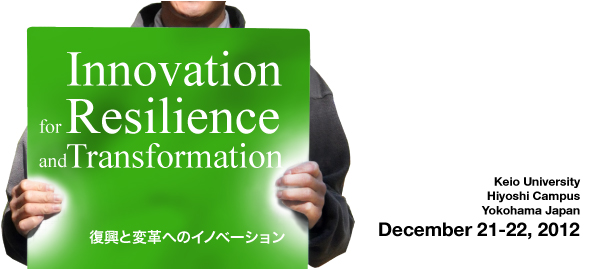The 3rd Environmental Innovators Symposium, Yokohama, Japan
10/12/2012
POSTED IN: GC PARTNER UPDATES, GLOBAL CHANGE ANNOUNCEMENTS
Organizer:
Keio University and the Environmental Innovators Program
with funding from Japan Science and technology Agency
Keio University and the Environmental Innovators Program
with funding from Japan Science and technology Agency
Co-organizers:
Institute for Global Environmental Strategies (IGES)
the Asia Pacific Adaptation Network (APAN)
Institute for Global Environmental Strategies (IGES)
the Asia Pacific Adaptation Network (APAN)
Themes:
- Practicing Adaptation in Northeast Asia
- Development and Environmental Risk in Asia
- Resiliency and Reconstruction in Architecture and Planning
- Smart Society and Community-Based Energy Innovation
In the last decade the concept of resiliency has become a key topic in a remarkably broad field of study and activity. It’s influence is brought to bear on everything from economics and politics, to architecture and urban planning, policy, psychology, and population change. Its proliferation is perhaps best understood as a reflection of a shared concern about our capacity as governments and individuals to cope with and adapt to change, whatever its cause.
In Japan the context for resilience remains the ongoing recovery from the series of disasters that struck the northeast coast in March 2011, causing massive damage and loss of life as well as food and fuel shortages and nation-wide power outages. The disasters also triggered an honest re-assessment of many of the policies and social standards the country has taken for granted for decades if not centuries. For some this is seen as an opportunity to create a more resilient society as part of the reconstruction process, but there is no clarity yet about which direction the reconstruction should go, and what resiliency might mean. Government practices and polices from before the disaster, as well as consumer behavior, architectural planning, disaster risk management, the use of technology, and even social and economic norms have all been challenged. But the question remains open as to whether we should be rebuilding defensively or if we might be better off aiming for a deeper transformation. As the recovery proceeds there is also growing uncertainty about where and how change can be implemented. At the same time, although these issues do not arise directly from global climate change, they share much with the problems expected from extreme weather events, as we are all too keenly reminded of by the recent storms, floods and related power outages experienced around the world. Coping with such extremes requires adaptation and a real transformation of culture as well as resilience building.
Currently the largest gap is the one between assessment and action. While we understand the situation better and better, the way forward is still clouded. In the third annual Environmental Innovators symposium our aim is to clear some of the uncertainty about action and methods for building resilience by bringing together practitioners who are testing new methods and taking action in the field with significant projects. Our position is that while there can be no single answer it is innovation in practice that will allow us to accumulate the knowledge needed to realize transformative goals.
This symposium will focus on innovations in practice that advance transformation in relation to both climate change adaptation and resiliency. Issues we expect to address include short and long term plans, how to implement change, the need for small and large scale responses, the role of technology, policy innovation, and the advent of new methodologies.
The symposium will be treated as a series of intense workshops where knowledge is shared and created through presentations and discussion over the two day event. A publication of the presentations and discussions is planned after the event and we invite participants to share their ideas freely and to engage in a thoughtful and lively discussion.









0 Comment :
Post a Comment
Thanks for your comment!